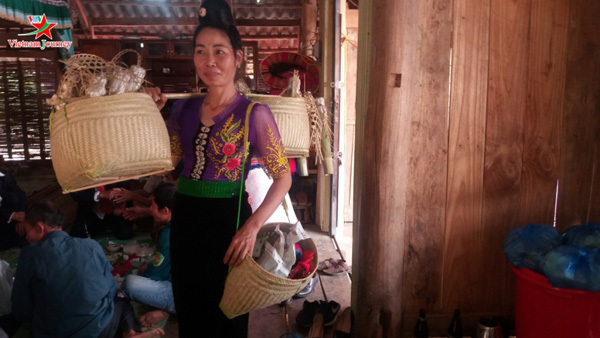 |
| A representative of the bride’s family receives wedding gifts from the bridegroom’s family. |
When a young Thai man wants to marry a girl, his family pays at least four visits to the girl’s family before the wedding.
On the first visit, his mother and another female relative meet the girl’s female family members and exchange general information about the families.
The second time, the man’s family brings sweet bananas and aromatic sugar as a gift and the two families discuss preparations for the wedding.
The third time, the man’s family invites a matchmaker to go with them to the girl’s family for a more detailed discussion of the wedding procedures. They bring with them liquor, steamed sticky rice, grilled fish, and two cooked chickens.
The last meeting between the two families will include the girl’s neighbours.
“The two families meet to agree on wedding procedures, gifts for the bride’s parents, and the length of time the groom will stay with the bride’s family,” says Cam Vui, an artisan from the Vietnamese Folklore Association in Son La Province. “They also choose a good day for the wedding.”
At the fourth meeting, the matchmakers from both sides sing Khap, a Thai call-and response singing style. At the wedding ceremony, the matchmakers and guests have a Khap singing session that lasts all night.
After the wedding, the husband stays with his wife’s family to work and pay tribute to her parents for raising her. During these years, the couple save up for a home of their own.
“The wife’s parents decide how long time the son-in law will live with them, from one to five years,” elaborates Tong Van Hia in Son La City. “Then he is allowed to bring his wife to his home. If the husband’s family has few people, he can ask his parents-in-law to allow him to bring his wife home after one year.”
According to Ca Thi Thinh, a local resident of Son La City, both daughters-in-law and sons-in-law must wake up earlier than the rest of the family. They must follow the family’s rules.
“Daughters-in-law must work hard, cook for the family, and weave headscarves and fabric. Sons-in-law do heavy work, repair farm tools, and work in the field,” says Thinh.
As society evolves, the custom of the groom living with the wife’s family has become less compulsory. Many Thai families still honor the tradition but make it easier for the couple to start their own household.
VOV5



